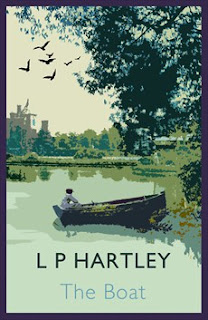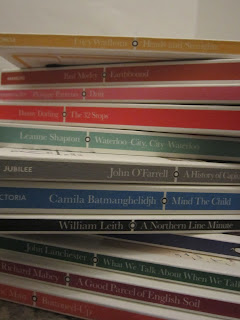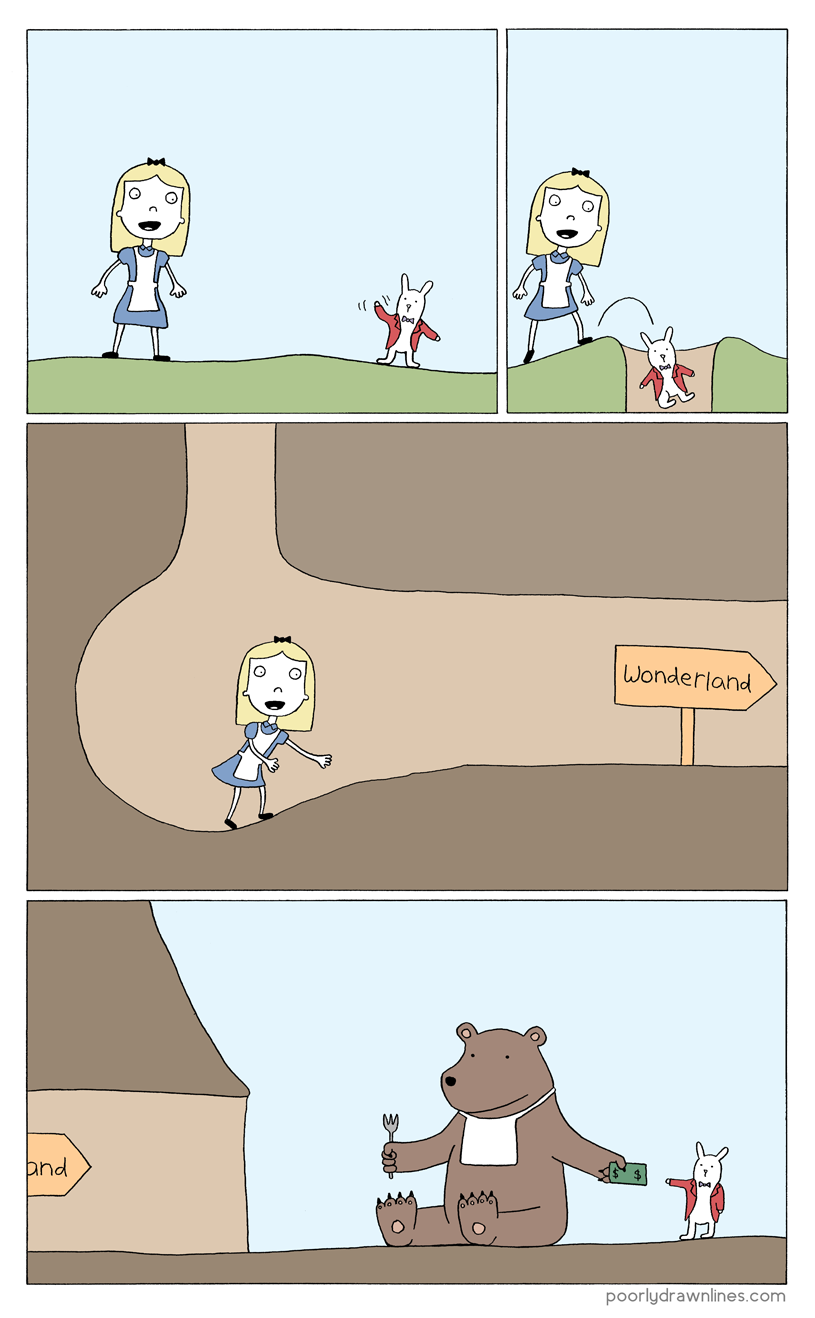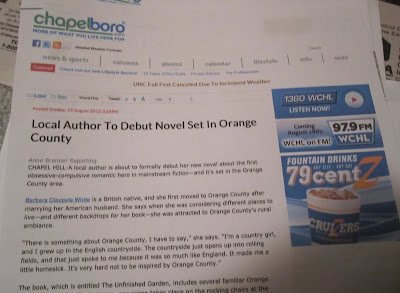Hayley has a good track record of giving me books that she hasn't hugely enjoyed, which I end up loving. First off was Marghanita Laski's
Love on the Supertax (which remains my favourite of her novels, although I've only read three); now is Vita Sackville-West's
The Easter Party (1953). I couldn't get a good photograph in the light, so I played around with the image instead.
It certainly isn't an unflawed novel. It is melodramatic and improbable. But, with the odd reservation or two, I loved it.
The Easter party in question is a gathering at Anstey, the beautiful country home of Walter and Rose Mortibois. In the party is Rose's dowdy, contented sister Lucy, with her husband Dick and 22 year old son Robin; eccentric, flirtatious Lady Quarles, and Walter's witty, intelligent brother Gilbert. It is a curious group of people, all a little wary of the situation, each with their own private or public anxieties. Which sounds a very trite way to describe the scenario - and, truth be told, Vita Sackville-West doesn't wander too far from the trite, at times.
This is especially true in the comparison of Rose and Lucy. Rose is in a loveless marriage - or, rather, an unloved partner in a marriage, for she devotedly loves Walter. He, however, never made any bones about what he was offering her. He prefixes his proposal with "I will not pretend to be in love with you," which is, of course, what every little girl dreams of happening. By contrast, Lucy and Dick have a delightful marriage. It is very rare to come across a lovely, loving couple in fiction, and Vita S-W has to be congratulated for creating a pair who, in middle-age, still call each other 'Pudding', and are adorable rather than nauseating.
So, yes, we have the rich, unhappy woman and her poor, happy woman. (By 'poor' I mean, naturally, 'only has one bathroom' - they're not on the streets.) It's not the most original set-up, and I did wonder whether Vita was writing this in a rush - it was her penultimate novel, and I already knew that I hadn't been much of a fan of her final one. But this turns out to be more than a collection of amusing, exaggerated characters and well-worn, inevitable moral lessons. Vita Sackville-West weaves something rather wonderful from this material. For starters, it is amusing - here is Gilbert's faux-horror at the idea of meeting Lady Quarles:
Are you trying to tell me that Lady Quarles is cosy? If so, I don't believe it. Nothing that I have ever heard of her indicates anything of the sort. It is true that my cognizance of her is limited to the piles of illustrated papers, all out of date, which I contemplate only when I visit, in a state of the greatest apprehension, my dentist or my doctor. I am perhaps then not in the best of moods to appreciate the charm of irresistible, lovable ladies propped on a shooting-stick in tweeds or entering a theatre by flashlight in an ermine cloak, but on the whole I think I had better not risk transferring my acquaintance with Lady Quarles from the printed page to the flesh. I might be disillusioned.
She is a wonderful character when she arrives - garrulous, excitable, somehow loved by all despite being an almighty nuisance. I found her a little less tolerable when she started bearing her soul - because she started declaiming things in a very third-act-Ibsen way. Thinking of
The Easter Party in dramatic terms was very helpful for these segments...
It is, however, with the host and hostess that
The Easter Party gets more interesting and original - and stand above similar novels. I don't know about you, but I find passion between humans in novels rather dull to read about - it's so apt, if not done perfectly, to smack of the third-rate melodrama. Perhaps it's my diet of soap operas which has made me so intolerant of these unconvincing sounding conversations. But what I
will run towards, eagerly, are novels where a human is has a passionate love for something non-human. I was going to say inanimate, but that's not true for the central passions in
The Easter Party.
For Rose, it is (besides her cold husband) Anstey and its gardens. In Vita Sackville-West's exceptionally brilliant novella
The Heir, a man develops a loving obsession with the house he inherited. Thirty years later, Vita Sackville-West is still exploring the relationship between person and property. She, of course, had this deep bond with her family home Knole (and was justifiably pained and outraged that the laws of primogeniture meant her gender precluded her inheriting it.) This affection, along with her expertise as a gardener, enables her to write beautifully and movingly about Anstey and its grounds:
The beauty of the renowned Anstey gardens! Rose stood amazed. Svend [the dog] brought one of his little sticks and dropped it at her feet and stood looking up, waiting for her to throw it, but she could take no notice. She was gazing across the lake, with the great amphitheatre of trees piling up behind it, and the classical temples standing at intervals along its shores. It was one of the most famous landscape gardens in England, laid out in the eighteenth century, far too big for the house it belonged to. The house, however, was not visible from here, and, but for the temples, the garden might not have been a thing of artifice at all, but part of the natural scenery of woods and water, stretching away indefinitely into the countryside, untended by the hand of man. Already the legions of wild daffodils were yellowing the grassy slopes, and a flight of duck rose from the lake which they frequented of their own accord. The air was soft with the first warmth of spring, which is so different from the last warmth of autumn; the difference between the beginning and the end, between arrival and departure.
But this is familiar Vita territory; I was not surprised to encounter it. A more unexpected, and unexpectedly moving, passion was the relationship Walter has with his Alsatian Svend. (And in case you're worrying, based on my previous reading of
Lady into Fox and
His Monkey Wife, fear not - their relationship is entirely unsuspect.) Walter, who cannot express affection for any human, including his wife, is devoted to his dog. The scenes describing their companionship and mutual trust could have felt like a mawkishly over-sentimental
Marley and Me intrusion, but are done so cleverly and touchingly, that I doubt anybody could censor them. And that's coming from a cat person. Svend even becomes an important plot pivot...
There are enough lingering secrets and unlikely speeches to make
The Easter Party feel like a throwback to theatrical melodrama, but Vita Sackville-West combines these with gorgeous description, genuine pathos, and a web of delicate writing which bewitches the reader. It's a heady mixture, and one I doubt many authors could pull off - but I loved it. Vita Sackville-West will never be in the same stable as Virginia Woolf, the author with whom she is still most often mentioned. She wasn't trying to be. She was a talented writer, crafting something unusual - somehow both willfully derivative and original, and (for me, at least) an absorbing, delightful, occasionally tragic, read. Thank you, Hayley!
































